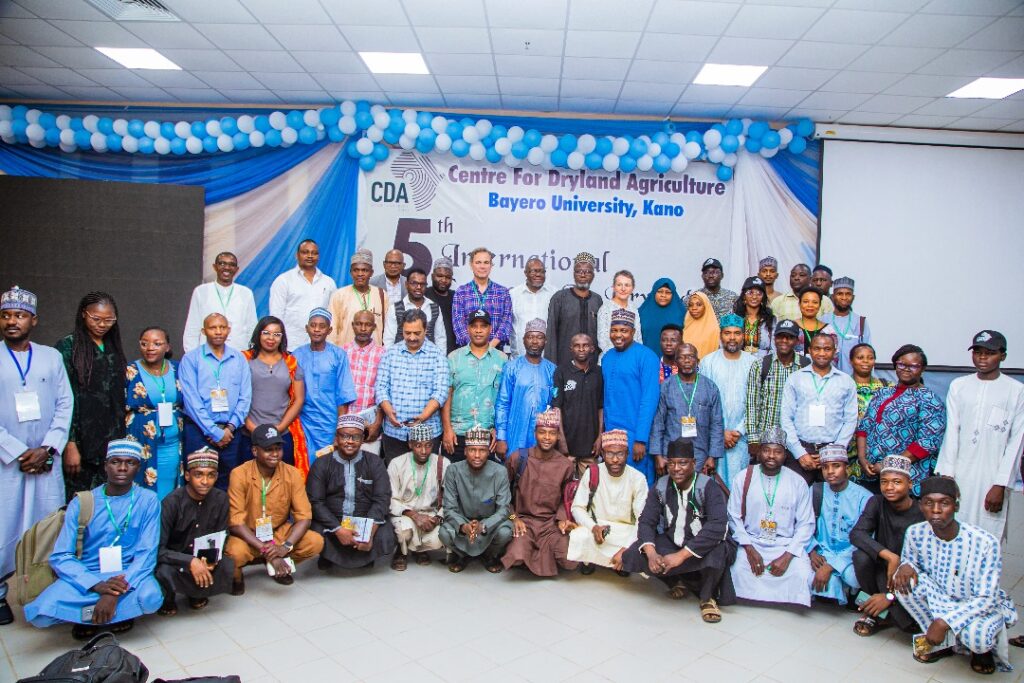Participants of the 5th International DryLands conference have urged governments and relevant stakeholders to develop and implement comprehensive, legal frameworks for sustainable rangeland management.
This was part of the resolutions at the end of the three-day conference organised by the Centre for Dryland Agriculture CDA Bayero University, Kano BUK.
A communique issued at the end of the conference highlighted that, participants called on government and relevant stakeholders to take decisive action to protect and restore the health of rangelands.
DryLands Conference Urges Governments to Protect Rangelands, Pastoralist Livelihoods
“Safeguard the livelihoods of pastoralist communities, and enhance climate resilience in dryland regions”
The three-day gathering brought together over 300 participants including scientists, researchers, policymakers, development partners, and representatives of the private sector.
Participants were drawn from 11 African countries, 13 Nigerian states, 17 academic institutions, and several international organizations, creating a rich platform for knowledge exchange, policy dialogue, and regional collaboration.
In a communiqué released at the end of the conference, participants urged governments to develop and implement comprehensive, participatory, and evidence-based legal frameworks that prioritize sustainable rangeland management.
They emphasized the need for policies that recognize, protect, and support the traditional knowledge and practices of pastoralists, while ensuring equitable access to land and natural resources.
Such policies, the communiqué noted, must include secure land tenure and fair resource governance to promote peaceful coexistence and prevent conflict over land use.
FG to Revive Grazing Reserves to Support Pastoralists-Minister
A key outcome of the conference was the recognition of the crucial role of women and youth, particularly those from pastoralist communities, in driving resilience and sustainability.
Participants called for increased investment in building their capacities, ensuring their active participation in decision-making processes, and supporting their access to income-generating opportunities and sustainable resource development projects.
The conference also stressed the importance of scaling up both public and private sector investments in climate change adaptation strategies, sustainable land management technologies, and diversified livelihood initiatives that can reduce the vulnerability of dryland populations.
These investments, according to participants, must be complemented by demand-driven research and the promotion of innovations that integrate indigenous knowledge systems with modern scientific approaches to deliver context-specific, sustainable solutions.
In view of the interconnected nature of dryland challenges, the conference called on international development partners and organizations to align their resources with the outcomes of the conference, and to enhance regional and global cooperation, particularly on transboundary issues.
There was a strong push for deeper engagement with global initiatives such as the US-led Vision for Adapted Crops and Soils (VACS), launched on the margins of the 2023 United Nations General Assembly, as well as the Africa Soil Initiative and related programs.
The private sector was encouraged to play a proactive role by identifying and investing in rangeland-based enterprises that not only ensure profitability but also contribute to ecological integrity and community well-being.
These enterprises, participants noted, could help create shared value and stimulate sustainable development in dryland areas.
Conference participants made it clear that the alarming degradation of rangelands, the increasing threats to pastoralist livelihoods, and the growing fragility of dryland ecosystems demand more than discussion they demand urgent, coll.
The conference highlighted the necessity of collaborative and sustained action to promote healthy rangelands, which are essential for achieving food security, ecological balance, and peaceful coexistence.
In this context, participants stressed the importance of leveraging the momentum of the International Year of Rangelands and Pastoralists (IYRP) in 2025 as a global platform.
This initiative aims to raise awareness, foster partnerships, and enhance collective efforts to ensure a prosperous future for rangelands not only in Nigeria but across Africa and around the globe.
Several key partners supported the conference, including the International Centre of Insect Physiology and Ecology (icipe) through the Regional Scholarship and Innovation Fund (RSIF), the International Maize and Wheat Improvement Center (CIMMYT), the International Crops Research Institute for the Semi-Arid Tropics (ICRISAT), the International Institute of Tropical Agriculture (IITA), and the International Livestock Research Institute (ILRI), along with PACET and Nigeria’s Federal Ministry of Agriculture and Food Security.eral Ministry of Environment, the Ministry of Livestock Development, and the Commonwealth Geographic Bureau (CGB).
Among its core objectives, the conference sought to share cutting-edge scientific and practical experiences in rangeland health and productivity, foster dialogue among key stakeholders including policymakers, pastoralists, researchers, and civil society, and identify strategies for enhancing climate resilience, food security, and peace in dryland communities.
It also aimed to strengthen partnerships that can drive regional research, capacity development, and policy influence across the dryland ecosystems of Africa.
Held from 6th to 8th May 2025 under the theme “Promoting Sustainability and Resilience of Rangelands: Present and Future Outlooks,”





